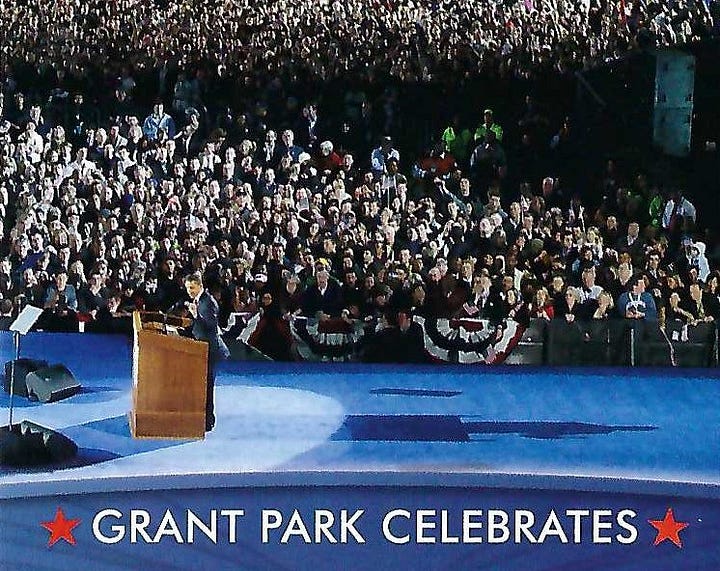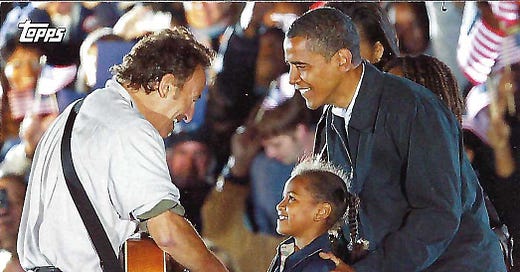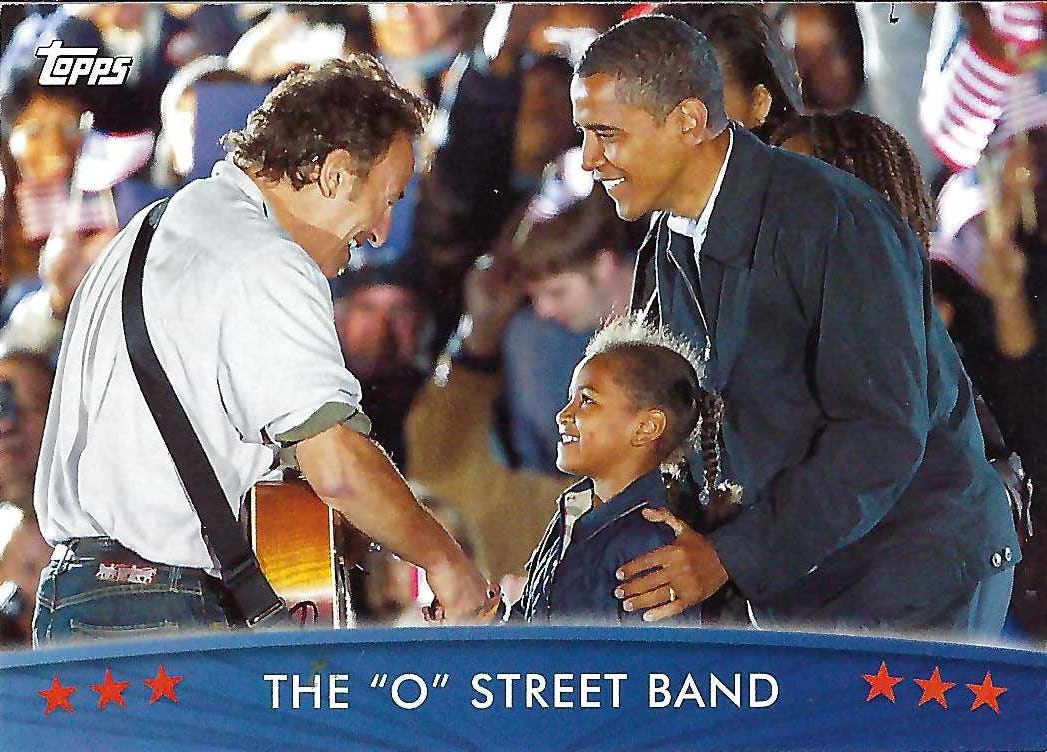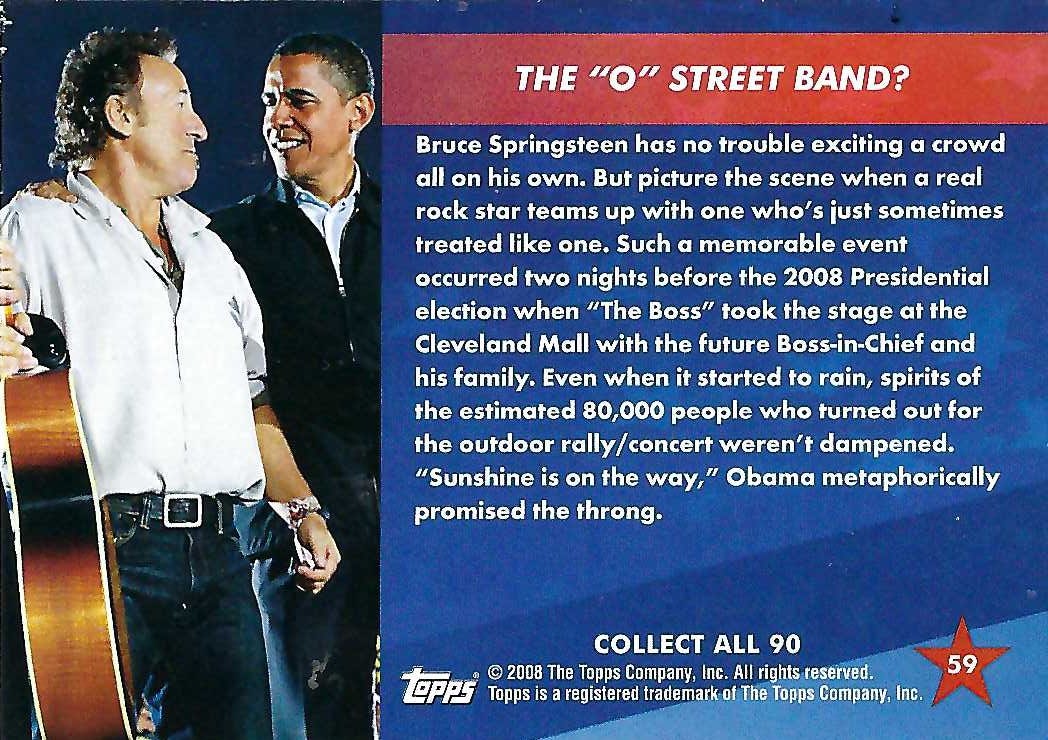

Tuesday, July 1 , 2025
In this Springsteen Substack, I am currently covering 2023-2024, the two-year period of supercharged Springsteen activity in my life. I have reached November 2023 in that timeline. November is election month, and the last time our country went to the polls, in 2024, the results were extremely upsetting for many of us, including Bruce Springsteen (and me). Therefore, I am reaching back to a November election that I consider a true high point for our country. In 2008, Barack Obama was elected to be the 44th President of the United States, becoming the first African-American chief executive in our history. Early on in this blog (while I was still reporting on my road trip to see the first four shows on Springsteen’s first post-pandemic tour), I wrote and posted a three-part article about the relationship between President Obama and Bruce Springsteen. I have decided to now re-post “The Boss and the President” series with quite a bit of reworking and some updates. These next entries will therefore serve as the rest of my posts representing November 2023. Especially considering the highly public combativeness happening right now between Springsteen and the current president (See Entries #162 and #163 ), I hope that revisiting the story of the mutual respect and kinship that Bruce Springsteen and President Obama have for one another will prove to be inspiring and encouraging.
Tuesday, November 7, 2023 Entry #171
As a kid, I was a big baseball card collector. I bought packs of them as often as I could, building my collection (trading or giving away any “doubles”), and especially seeking cards of my favorite players. I loved just looking at the photo and the team insignia on the front of each card, and I poured over the biographical information and statistics on the back. I counted my cards obsessively and made checklists to keep track of them. The stiff, pink, chalky, and sugary rectangle of bubblegum that the cards came with was definitely a tasty bonus. I begged my parents to purchase for me all the different ways to organize and store my treasures—official checklists, specialized albums, frames (for my favorite cards), laminations, and even a box made to look like a player’s locker with baseball card-sized slots inside.
So, I got a sweet rush of nostalgia when I discovered that Topps, the very same iconic company that made the baseball cards I collected all those decades ago, had put out a special edition of ninety cards depicting moments from Barack Obama’s 2008 meteoric rise to the presidency (with a picture on the front and some narrative on the back). When I found out that one of the cards in the collection featured the partnership of Obama and Bruce Springsteen, I hurriedly ordered the entire set as a collector’s item.
I figure that any two people who rank highly enough for their own Topps “baseball card” certainly deserve a multi-post exploration of their relationship in this Springsteen Substack I have been writing and maintaining. Which is to say, thank you for indulging my fascination with the celebrated pair, the President and the Boss (as Springsteen has said, it is the job of an artist to make people care about your obsessions), and I promise, I am coming in soon for a landing.
In the past few posts, I have recounted some of the history of Bruce Springsteen and Barack Obama’s partnership and friendship, from the 2008 presidential campaign, to moments shared in the White House and President Obama's race for his re-election, to Springsteen and Obama teaming up for a podcast and a book 2021. In this entry, I will highlight some of the broad themes, traits and values that are shared by the President and the Boss, as these commonalities are certainly a big part of what fostered their relationship.
Embracing and Celebrating Diversity
President Obama introduced himself to the nation as a politician who fully embraced diversity. Moreover, as the son of a black Kenyan father and a white mother from Kansas (a self-described “skinny kid with a funny name”), he also personally manifested the notion of the integration of multiple identities. Here is some of what Obama has had to say on the subject:
“We know that our diversity, our patchwork heritage, is not a weakness. It is still and always will be one of our greatest strengths…What makes America exceptional isn’t our wealth or size or skyscrapers or military power. It’s the fact that America is the only nation in human history that’s made up of people of every race, religion, and culture from every corner of the globe. And that we’ve had faith in our democracy, our common creed, to blend this hodgepodge of humanity into one people…I see Americans of every party, every background, every faith who believe that we are stronger together — black, white, Latino, Asian, Native American; young and old; gay, straight, men, women, and folks with disabilities, all pledging allegiance, under the same proud flag, to this big, bold country that we love.”
Bruce Springsteen’s own grand endorsement of American diversity is at the heart of “Land of Hope and Dreams,” his song which poetically envisions the nation as a train rolling forward with room for every type of person imaginable. I am so taken with it that I wrote an entire essay about this song, which Springsteen performed when Obama’s Vice-President, Joe Biden, was inaugurated as the 46th President of the United States (see Entry #53).
This train carries saints and sinners, this train carries losers and winners, this train carries whores and gamblers, this train carries lost souls. This train carries broken-hearted, this train, thieves and sweet souls departed, this train carries fools and kings, this train, all aboard. This train, dreams will not be thwarted, this train, faith will be rewarded. This train, hear the steel wheels singin', this train, bells of freedom ringin' -Lyrics from “Land of Hope and Dreams”
During the Renegades (See Entry #70) podcast, Obama relayed a story from the Civil Rights Movement to Springsteen that strongly “tracked” with the vision of “Land of Hope and Dreams.”
“There’s a standoff, this historic clash of two ideas of America. On one side, you’ve got the idea that, ‘America is just for certain people who have to be and look a certain way.’ And on the other side…this idea of ‘America’s for everybody.’…America is a place where you don’t have to look a certain way, you don’t have to come from a certain family, you don’t have to come from a certain religious background…It’s the idea that we take all comers—those who came here as outcasts, outsiders, misfits, the discarded and the scorned. That here you’re supposed to be able to overcome all that and make something new. That is the idea of America as it can be…That’s what you (Springsteen) sing about.”
Asserting that the African-American Story is an American Story
Many public officials talk about issues facing the African-American community as isolated from the rest of national affairs. On the other hand, in his refreshingly holistic manner, President Obama is always able to weave the experiences, history, and concerns of Black Americans into the larger American story and agenda:
It was a creed written into the founding documents that declared the destiny of a nation: Yes, we can. It was whispered by slaves and abolitionists as they blazed a trail towards freedom through the darkest of nights: Yes, we can…It was the call of workers who organized, women who reached for the ballot, a president who chose the moon as our new frontier, and a King who took us to the mountaintop and pointed the way to the promised land.” -From Barack Obama’s “Yes We Can” speech
Springsteen succinctly gives voice to the same integrative notion in his song “American Skin (41 Shots),”written about African immigrant Amadou Diallo, who was killed by four New York City police officers in a case of mistaken identity (See Entry #70). “You can get killed just for living in your American skin,” Springsteen repeats throughout the song. In that title phrase, Springsteen poetically reminds us of something that should be a no-brainer but is clearly not. Though non-whites are too often regarded as “Other,” the reality of “American skin” is that people with every color and shade are part of our national fabric and we should all expect equal treatment.
Recognizing American Virtues and American Sins
Bruce Springsteen has been referred to as a symbol of America for years, and he carries out the responsibility that comes with such a reputation in a clear-eyed manner. Springsteen definitely sings and talks about the many joys and virtues of “Americana,” but he obviously doesn’t shy away from commenting on our nation’s flaws and sins either. Lately (here in 2025), Springsteen has been making this statement directly from the stage.
“I’ve always tried to be a good ambassador for America. I spent my life and everything I had singing about where we have succeeded and where we have come up short in living up to our civic ideals and our dreams. I always just thought that was my job.”
In his Broadway show, Springsteen would muse, “What did it mean to be an American? And to be a part of that story, in this place and in this time? I wanted to be able to celebrate and honor its beauty, its power. And I wanted to be able to be a critical voice when I thought that’s what the times called for.”
President Obama certainly strikes a patriotic note speaking about the singular achievements of the American experiment, often using his own journey as evidence of our country’s greatness.
“I stand here knowing that my story is part of the larger American story. That I owe a debt to all those who came before me. And that in no other country on Earth is my story even possible.”
Springsteen struck an incredibly similar tone in his half of the introduction to the book based on the Springsteen-Obama podcast:
“(We share a) dedication to the American idea and an abiding love for the country that made us. We are both creatures stamped BORN IN THE USA. There is no other country that could have concocted the mix that makes a Barack Obama or a Bruce Springsteen, so our allegiance to its institutions, its dreams, and its ambitions remain unyielding.”
As to the other side of the virtue and sin spectrum, Obama is known for being unusually (for an United State President) open with acknowledging the mistakes and apologizing for the misdeeds of the nation he led. In a 2016 trip that included stops in Vietnam and Hiroshima that the White House announced would include a “reckoning with history,” President Obama spoke openly about the ramifications of American warfare involving both places. Closer to home, while a candidate and as president, Obama expressed empathy with those who suffered from the economic crisis which he called a “self-inflicted wound.” In song (basically the entire Wrecking Ball album was about economic injustice) and speech, Springsteen also vented his anger over that moment in our history saying, “A basic theft had occurred that struck at the heart of what the entire American idea was about.”
Obama and Springsteen often strike the balance between praising and critiquing the United States by expressing hope that our nation has what it takes to traverse the distance from the uneven record of our current reality to the eventual full realization of our national promise. Springsteen once said that,
“I am a critical patriot. You can be very critical of your nation and very proud of your nation simultaneously…I have dedicated part of my life to having a voice in the conversation about bringing us closer to our country’s stated ideals.”
Speaking about performing overseas, Springsteen further said on this topic:
“The people over there have been fascinated by the American story, our films and music, for a long time…We (Springsteen and the E Street Band) project drama, emotional power, rush of freedom, symbolism of equality, community, comradeship, and a pursuit of good times. We tried to create a sound that felt as big as our country itself. We celebrate what’s best about our country, and we criticize our country’s failings.”
President Obama often repeats Martin Luther King’s assertion that “the arc of the moral universe is long, but it bends towards justice.” Here, Obama suggests that we do in fact move from the way things are to the way they ought to be. A little bit at a time.
“The world is fascinated to know: Can this work? Can this experiment where you throw in all of us together and you set up a democracy where everybody is supposed to have a vote…and you claim that all men are created equal-can it work?...In the back of their minds what they’re also thinking is, If they could get it right, that would be a good thing. The recognition and the dignity of all people, everybody having opportunity and every child being able to become president…Every so often we’ll actually be who we say we are, and when that happens, the world feels just a little bit more hopeful.”
Reaching for Common Ground
The keynote speech Barack Obama gave at the 2004 Democratic National Convention launched and defined his career as a national leader. Obama made a conscious decision that, in the midst of a highly partisan event, he would focus on how much Americans have in common with one another, even with people who belong to the opposing political side.
The pundits like to slice-and-dice our country into red states and blue states; red states for Republicans, blue states for Democrats. But I've got news for them, too. We worship an awesome God in the blue states, and we don't like federal agents poking around in our libraries in the red states. We coach Little League in the blue states and yes, we've got some gay friends in the red states. There are patriots who opposed the war in Iraq and there are patriots who supported the war in Iraq.
In the Renegades podcast, Obama asked Springsteen how he thought some of our societal divides could be bridged. Springsteen replied with a subtle reference to Obama’s famous speech:
“Politically connecting across party lines, rediscovering common experience, the love of country, a new national identity that includes a multicultural picture of the United States that’s real today, rooted in common ideas and just seeing one another as Americans again, whether it’s blue, red, Black, White. Those are hard, hard things to do, and any way we cut it, it’s a long walk home.”
The phrase “long walk home” was self-referential, the title of a 2007 Springsteen song about straying from our national ideals, Springsteen has taken to introducing this cautionary tale in the Trump era by saying, “This is a prayer for my country.”
On a hot button issue like cultural appropriation, Obama and Springsteen also sing from the same hymnal:
PRESIDENT OBAMA: This whole issue of cultural appropriation—I have to say I’m not a believer in narrowly defining who gets to do what.
BRUCE SPRINGSTEEN: I’m with you on that.
PRESIDENT OBAMA: That’s the nature of humanity. That is the nature of culture. That is how ideas migrate. That’s how music gets created. I don’t want us to be thinking that there’s this way for that person, and that way is for the other person. I also want to be able to appropriate and claim for myself the example of the good things that other people have done even if they weren’t perfect.
BRUCE SPRINGSTEEN: I agree.
Again and again, Springsteen and Obama err on the side of blending, integrating, and weaving our diversity into a greater wholeness. Our differences, they believe, are overshadowed by everything that connects us.
Even in the face of a bitterly divided electorate, and Springsteen’s open disdain of Donald Trump, Springsteen’s official endorsement of Vice-President Kamala Harris’ presidential campaign in 2024, included this attempt at a semblance of unity. “Everybody sees things differently,” Springsteen said into the camera, “and I respect your choice as a fellow citizen.” As that election was playing out, and Springsteen had forcefully and publicly made his preference known, he still made a conscious decision to avoid explicit politics on tour saying, “People know where I stand…but I also wanted a space where people could feel they can come and be with their neighbor regardless of their particular political point of view.” (Clearly, as of the summer of 2025, that has changed as Springsteen is talking in highly negative terms about the Trump administration at his concerts. (It should be noted that all of those shows have been in Europe, and it remains to be seen if Springsteen will soften his monologues in the U.S. where they are bound to be more divisive).
Balancing Individualism and Communalism
There are strains of both rugged individualism and compassionate collectivism throughout the history of the United States. Springsteen and Obama agree upon the need to appreciate and respect both national tendencies.
Springsteen’s early songs certainly created an aura of freedom from constraint, the notion that he was ‘born to run,’ so to speak. Yet, much of his later work leans into the need for collective responsibility. In twenty-first century compositions like “We Take Care of Our Own” (often utilized as a theme song for Democratic candidates, including President Obama in 2012), Springsteen expresses this conviction. He also reinforces this focus through one of the catch phrases he will exclaim from the concert stage, “Nobody wins unless everybody wins.”
In a revealing moment on the Renegades podcast, Springsteen is talking about this topic. Obama then chimes in, “Because you, know, contrary to the song of a great American master, we’re generally not “born to run.” Most of us are born to run a little bit and go back home.” Alongside our famous individualism, there’s another ingredient in the American saga-a belief that we’re all connected as one people.”
As extraordinarily wealthy people with finely tuned social consciences, Springsteen and Obama ultimately seem to be seeking ways to temper individualism with communalism and vice-versa.
As Springsteen put it:
“At the end of the day, if you see America as this beloved community, then the bottom line is you owe something to your neighbors and they owe something to you. Recognize each other for who we are. Continue collectively building a country whose gifts and blessings fall upon all. I’ve enjoyed my success as much as the next guy. But I didn’t think that it means you had to abandon these ideas, these values.”
”In America, we’re not supposed to leave anybody behind. A dignified living is not too much to ask. Where you take it from there is up to you but that much should be a birthright.”
Obama echoed the sentiment and issued a challenge: ”One of the things that I never understood is why people would want individual success at the exclusion of other people.”
Inspirational Crowd Pleasers
Finally, there is this talent Springsteen and Obama share. Both of them have the knack of not only generating large crowds, but using that ability to inspire and uplift their audiences, giving attendees the invaluable feeling like anything is possible. During his initial race for the presidency, Obama was known for rallies that became rock concert-like spectacles with the “music” being Obama’s message of hope and change. There were multiple reports of people literally fainting at Obama events, recalling the early Beatlemania phenomenon.
Springsteen, of course, is legendary for his energetic, transcendent, life-affirming and marathon-length performances. There is very little that I can compare to those thrilling and unifying moments at a Springsteen show when the house lights of the arena come on full boar amidst the blazing noise of smashing drums, slashing guitars, passionate voices and ecstatic, open-hearted fans. As Springsteen says without irony or pretense, “I want to ROCK your soul!”
The audiences at Springsteen concerts and Obama rallies feel as though they matter to the man on the stage, and Springsteen and Obama believe in turn that a true relationship is being formed through the dynamic. In the book Deliver Me From Nowhere (soon to be a major motion picture!), author (and rock musician) Warren Zanes captured this sensation well. “He (Springsteen) would talk to the audience, and they’d talk back. (He’s) an artist who had gotten so much from getting onstage, from looking out there for proof of life among the bodies who looked back. If they were ok, he was ok.”
Bruce Springsteen summed up his and Obama’s larger goals (besides entertaining crowds or campaigning for votes) for a rally or a concert:
“A gathering of souls can blow the blues away, let more sun in, keep you breathing, transmit a vicious joy and a voracious hunger for life, lift you in a way that can’t be explained, only experienced.”
The last words here will belong to the principles, the subjects of an actual Topps trading card, the Boss and the President. In their podcast, they start talking about how they hope Springsteen’s songs, Obama’s speeches, and their recorded conversations will let the next generation know they are on the right track. In this time and place where so much of their shared values-diversity, unity, and nuance-are under severe attack from the highest offices in our government, I am incredibly heartened that President Obama and Bruce Springsteen are leaving a legacy that will continue to be a guiding light.
BRUCE SPRINGSTEEN: You’ve gotta keep the lantern lit, my friend,
PRESIDENT OBAMA: Yes! Exactly.





Wow! Such an impressive piece of writing! Your ability to weave personal reflection with historical context is admirable! Thoroughly engaging! 👏👏👏